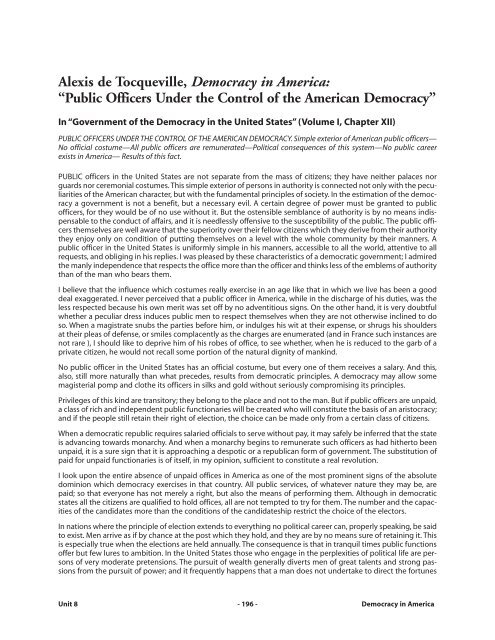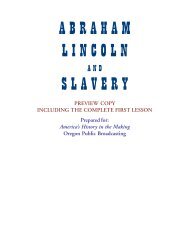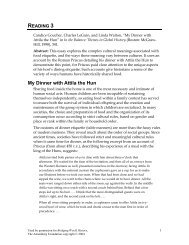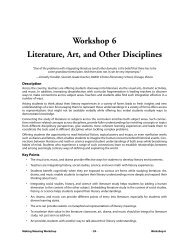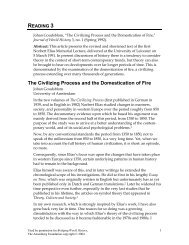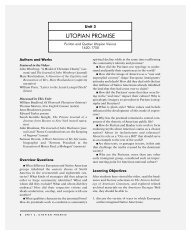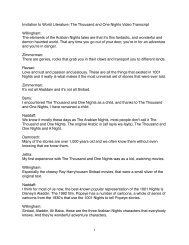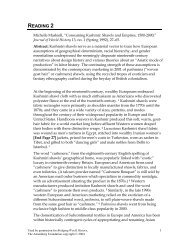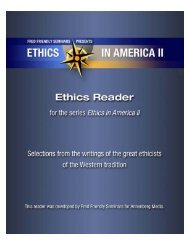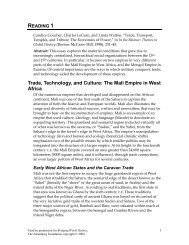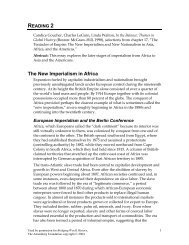Download Unit 8 Readings, Bureaucracy: A Controversial Necessity
Download Unit 8 Readings, Bureaucracy: A Controversial Necessity
Download Unit 8 Readings, Bureaucracy: A Controversial Necessity
Create successful ePaper yourself
Turn your PDF publications into a flip-book with our unique Google optimized e-Paper software.
Alexis de Tocqueville, Democracy in America:<br />
“Public Officers Under the Control of the American Democracy”<br />
In “Government of the Democracy in the <strong>Unit</strong>ed States” (Volume I, Chapter XII)<br />
PUBLIC OFFICERS UNDER THE CONTROL OF THE AMERICAN DEMOCRACY. Simple exterior of American public officers—<br />
No official costume—All public officers are remunerated—Political consequences of this system—No public career<br />
exists in America— Results of this fact.<br />
PUBLIC officers in the <strong>Unit</strong>ed States are not separate from the mass of citizens; they have neither palaces nor<br />
guards nor ceremonial costumes. This simple exterior of persons in authority is connected not only with the peculiarities<br />
of the American character, but with the fundamental principles of society. In the estimation of the democracy<br />
a government is not a benefit, but a necessary evil. A certain degree of power must be granted to public<br />
officers, for they would be of no use without it. But the ostensible semblance of authority is by no means indispensable<br />
to the conduct of affairs, and it is needlessly offensive to the susceptibility of the public. The public officers<br />
themselves are well aware that the superiority over their fellow citizens which they derive from their authority<br />
they enjoy only on condition of putting themselves on a level with the whole community by their manners. A<br />
public officer in the <strong>Unit</strong>ed States is uniformly simple in his manners, accessible to all the world, attentive to all<br />
requests, and obliging in his replies. I was pleased by these characteristics of a democratic government; I admired<br />
the manly independence that respects the office more than the officer and thinks less of the emblems of authority<br />
than of the man who bears them.<br />
I believe that the influence which costumes really exercise in an age like that in which we live has been a good<br />
deal exaggerated. I never perceived that a public officer in America, while in the discharge of his duties, was the<br />
less respected because his own merit was set off by no adventitious signs. On the other hand, it is very doubtful<br />
whether a peculiar dress induces public men to respect themselves when they are not otherwise inclined to do<br />
so. When a magistrate snubs the parties before him, or indulges his wit at their expense, or shrugs his shoulders<br />
at their pleas of defense, or smiles complacently as the charges are enumerated (and in France such instances are<br />
not rare ), I should like to deprive him of his robes of office, to see whether, when he is reduced to the garb of a<br />
private citizen, he would not recall some portion of the natural dignity of mankind.<br />
No public officer in the <strong>Unit</strong>ed States has an official costume, but every one of them receives a salary. And this,<br />
also, still more naturally than what precedes, results from democratic principles. A democracy may allow some<br />
magisterial pomp and clothe its officers in silks and gold without seriously compromising its principles.<br />
Privileges of this kind are transitory; they belong to the place and not to the man. But if public officers are unpaid,<br />
a class of rich and independent public functionaries will be created who will constitute the basis of an aristocracy;<br />
and if the people still retain their right of election, the choice can be made only from a certain class of citizens.<br />
When a democratic republic requires salaried officials to serve without pay, it may safely be inferred that the state<br />
is advancing towards monarchy. And when a monarchy begins to remunerate such officers as had hitherto been<br />
unpaid, it is a sure sign that it is approaching a despotic or a republican form of government. The substitution of<br />
paid for unpaid functionaries is of itself, in my opinion, sufficient to constitute a real revolution.<br />
I look upon the entire absence of unpaid offices in America as one of the most prominent signs of the absolute<br />
dominion which democracy exercises in that country. All public services, of whatever nature they may be, are<br />
paid; so that everyone has not merely a right, but also the means of performing them. Although in democratic<br />
states all the citizens are qualified to hold offices, all are not tempted to try for them. The number and the capacities<br />
of the candidates more than the conditions of the candidateship restrict the choice of the electors.<br />
In nations where the principle of election extends to everything no political career can, properly speaking, be said<br />
to exist. Men arrive as if by chance at the post which they hold, and they are by no means sure of retaining it. This<br />
is especially true when the elections are held annually. The consequence is that in tranquil times public functions<br />
offer but few lures to ambition. In the <strong>Unit</strong>ed States those who engage in the perplexities of political life are persons<br />
of very moderate pretensions. The pursuit of wealth generally diverts men of great talents and strong passions<br />
from the pursuit of power; and it frequently happens that a man does not undertake to direct the fortunes<br />
<strong>Unit</strong> 8 - 196 - Democracy in America


